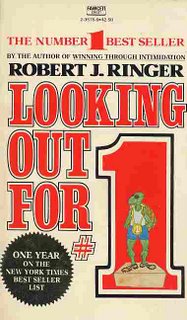"Looking Out for Number One" - the Book

What better summarization of the “Me Decade” than this run-away bestseller, by the author of Winning Through Intimidation? This classic, which I found recently at a charity sale, is a great example of probably the best-remembered of the great movements of the Seventies. While some folks delved into various forms of spirituality, grew bean sprouts or attempted to escape the rat race by living communally, many others tried the exact opposite approach; they embraced (and celebrated) a particularly blunt form of selfishness.
Author Robert J. Ringer doesn’t provide us with much information about his background or credentials in this book, but judging from the less than one and a half pages of notes at the end, he seems to have been no shrink, scholar or preacher. No matter; who said you need credentials to write a self-help book? Ringer’s major influence, which will come as no surprise to many, was Ayn Rand, high-priestess of selfishness. As with most volumes of this genre, you can sum up his ideas with a few brief statements:
1. People are inherently selfish, and you should be likewise.
2. Idealists such as Gandhi were really selfish egotists.
3. Don’t trust people who don’t tell you their real, selfish motives up-front.
4. Governments and other institutions that want your time and money are greedy slime.
Ringer scoffs at John F. Kennedy’s famous lines “Ask not what your country can do for you. Ask what you can do for your country!” No way, JFK! Your country is just an abstract entity, controlled by power freaks who want your money. Everyone should just act in their own interests, as they perceive them to be. You won’t find any references to the great moral teachers from any society in this book; nor will you encounter spirituality in any form. Ringer, like many of the success gurus of his era, saw no need for that stuff. He even scoffed at the person who left a newspaper clipping on the energy crisis (which he didn’t believe existed) in his door after he left the flood lights around his house on all night long. Oh yeah, and never volunteer for anything. I gather Ringer never lined up at the Bloodmobile, and I would hate to have to approach him about the office Christmas Toy Drive.
There is a definite naïve simplicity in LOOFO, just as there was in so many of the self-help books of its day. The idea was that just about anyone could change, and thereby become rich, famous or romantically successful simply by changing a few behaviors. And, consequently, anyone who isn’t wealthy, popular, etc has nobody to blame but him/herself.

0 Comments:
Post a Comment
Subscribe to Post Comments [Atom]
<< Home